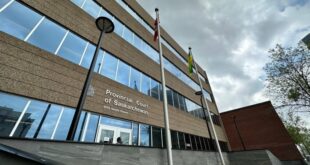Documents released under access to information legislation show 18 letters, but no wider consultation

The Saskatchewan government announced its controversial school pronoun policy after receiving 18 letters from concerned citizens and without holding any external consultations, according to recently released internal documents.
"What's shocking is how little there is here to justify such drastic legislative action," said Charles Smith, an associate professor of political studies at the University of Saskatchewan, who looked through the documents, which CBC obtained through access to information requests.
"The political lobbying is minimal at best. Eighteen people is not a significant political push. So the question is what was driving the government? Something else is clearly happening here, likely political calculations."
All of the letters urge the province to adopt a policy around pronoun use in schools. Sixteen of the letters explicitly call for legislation similar to what had already been introduced in New Brunswick via Policy 713.
One letter-writer asks the province to "STOP the radical, evil indoctrination" of sexual orientation and gender identity (SOGI) in the curriculum, while another wrote that "parental rights and responsibilities must NOT be removed to satisfy the demands of the LGBTQ + minority."
"Many other countries have fully embraced gender ideology and after dire consequences have realized that it's very destructive and inappropriate," wrote one letter-writer, saying that being part of the LGBT community became "trendy," driving some people to identify as transgender, without offering evidence to back the claim.
Four letters contain the identical phrase, "Please follow New Brunswick's example by instituting a policy that requires parental consent before minor children can use opposite-sex pronouns and change their names at school."

No evidence that Sask. consulted about pronoun policy despite premier, education minister claims: documents
4 hours ago
Saskatchewan’s Ministry of Education has released copies of 18 letters sent to the province encouraging it to develop a policy addressing pronoun use in schools.
Smith said it's evident that some of the letter writers had genuine concerns, but that several letters using very similar language points to the use of form emails.
"We're talking about a very small amount of dialogue between some citizens," he said, noting that shifts on the political right in the United States and Canada are propelling issues like pronouns into the forefront in Saskatchewan.
Former education minister Dustin Duncan and current Education Minister Jeremy Cockrill insisted at various times that they had held consultations on the policy.
Premier Scott Moe said the policy was the result of "multiple conversations various government MLAs have had with parents, educators, others, and myself included as an MLA."

A commissioner with the Saskatchewan Human Rights Commission has resigned. She says she will not be part of taking away the rights of children, particularly vulnerable children. We find out why the government's pronoun policy in schools felt personal to her – and why she's taking a stand against it.
CBC News submitted an access to information request asking for a list of all organizations consulted by the province in its development of the "Use of Preferred First Name and Pronouns by Students" policy. The documents were supposed to encapsulate a time period from 2020 until the policy was released in August.
The Ministry of Education released a 17-page jurisdictional scan dated Aug. 18.
The document provides a detailed breakdown of each province and territory's policies on parental notification or consent requirements when children request schools address them by new pronouns.
It also examines policies in countries such as the United States, England, Australia and France. The existing policies at two school divisions in Saskatchewan – Good Spirit School Division and Lloydminster Catholic School Division – and two in Ontario are also highlighted.
Despite Moe and Cockrill claiming that a procedure change by the Regina Public School Board in 2022 was an impetus for the government's policy, that school board is not mentioned in the jurisdictional scan.
Matt Love, education critic for the Saskatchewan's Opposition NDP, said sexual and gender identity was not a major concern for Saskatchewan people prior to the introduction of the education bill, yet the government ate up time and expense with an emergency sitting called over the act.
"I have not yet, in my time in this building, seen any piece of legislation come forward, pinned on conversations that happened at the grocery store," he said. "That's not how legislation is made in this province or really in any other democratic jurisdiction."

Sask. Premier, Opposition Leader trade barbs over pronoun policy as session begins early
2 months ago
Sask. Premier Scott Moe and Opposition Leader Carla Beck went back and forth in the legislature Tuesday. Moe called MLAs back early to push through legislation allowing the province to use the notwithstanding clause to protect its controversial school pronoun policy.
Smith agreed, noting there are several stakeholders involved in education, including school boards, teachers, parents and students themselves.
"None of that's present in this implementation plan that's been presented through these FOI requests."
While anyone can engage in lobbying efforts, when it comes to things with a potential impact on human rights like the pronoun policy, governments should examine and consult before undertaking dramatic action, said Smith.
"Is that enough to dramatically reverse a policy that could run roughshod over people's human rights? Arguably, I think no."
ABOUT THE AUTHOR
Reporter
Alexander Quon is a reporter with CBC Saskatchewan based in Regina. After working in Atlantic Canada for four years he's happy to be back in his home province. He has previously worked with the CBC News investigative unit in Nova Scotia and Global News in Halifax. Alexander specializes in data-reporting, COVID-19 and municipal political coverage. He can be reached at: Alexander.Quon@cbc.ca.
With files from Janani Whitfield and Dayne Patterson
*****
Credit belongs to : www.cbc.ca
 MaharlikaNews | Canada Leading Online Filipino Newspaper Portal The No. 1 most engaged information website for Filipino – Canadian in Canada. MaharlikaNews.com received almost a quarter a million visitors in 2020.
MaharlikaNews | Canada Leading Online Filipino Newspaper Portal The No. 1 most engaged information website for Filipino – Canadian in Canada. MaharlikaNews.com received almost a quarter a million visitors in 2020.







